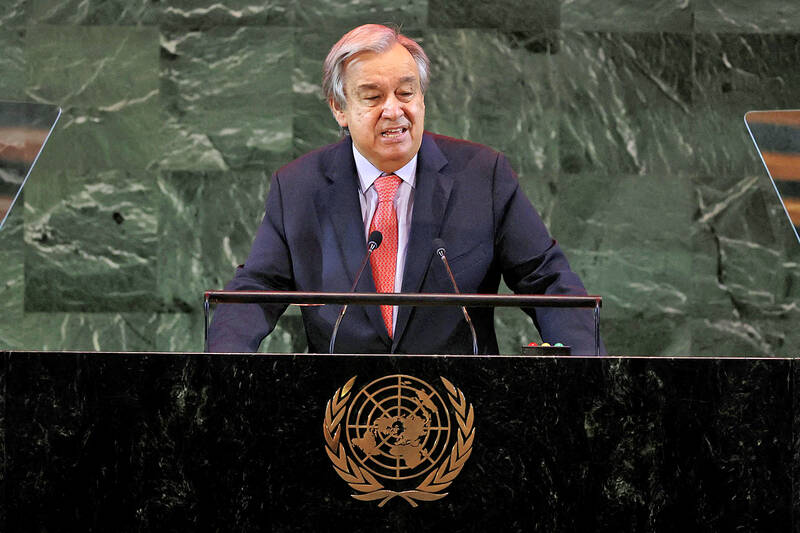The UN’s massive annual summit yesterday returned in person to a world divided by multiple crises starting with Ukraine.
After two years of COVID-19 pandemic restrictions and video addresses, the UN General Assembly asked leaders to come in person if they wish to speak — with a sole exception made for Ukrainian President Volodymyr Zelenskiy.
However, the death of Queen Elizabeth II disrupted the summit anew. US President Joe Biden, by tradition the second speaker on the first day, would instead speak today.

Photo: Reuters
The first day was to feature French President Emmanuel Macron and German Chancellor Olaf Scholz, the leaders of the two largest economies of the EU, which has mobilized to impose tough sanctions over Russia’s invasion of Ukraine.
“This year, Ukraine will be very high on the agenda. It will be unavoidable,” EU High Representative for Foreign Affairs and Security Policy Josep Borrell told reporters in New York.
“There are many other problems, we know, but the war in Ukraine has been sending shock waves around the world,” he said.
German Minister of Foreign Affairs Annalena Baerbock yesterday vowed to support countries hardest hit by the fallout from the war as she headed to the General Assembly.
“The brutality of Russia’s war of aggression and its threat to the peace order in Europe have not blinded us to the fact that its dramatic effects are also clearly being felt in many other regions of the world,” Baerbock said.
Meanwhile, UN Secretary-General Antonio Guterres has been urging leaders not to forget other priorities, such as education, the topic of a special summit on Monday.
“Education is in a deep crisis. Instead of being the great enabler, education is fast becoming the great divide,” Guterres told the summit.
He warned that the COVID-19 pandemic has had a devastating impact on learning, with poor students lacking technology at a particular disadvantage, and conflicts further disrupting schools.
Other leaders scheduled to speak yesterday included Turkish President Recep Tayyip Erdogan, who has staked out ground as a broker between Russia and Ukraine, including through a deal to ship out badly needed grain to the world.
In the type of last-minute diplomacy common at previous UN sessions, US Secretary of State Antony Blinken convened a first meeting of the foreign ministers of Azerbaijan and Armenia since a flare-up in fighting.
“Strong, sustainable diplomatic engagement is the best path for everyone,” Blinken told them.
Russian Minister of Foreign Affairs Sergei Lavrov was visiting, despite a hostile reaction from the US.
He met on Monday with his French counterpart, Catherine Colonna, who urged Russia to allow a security zone outside the Zaporizhzhia nuclear plant, whose occupation by Moscow has raised mounting concerns.
Also high on the agenda for the UN week would be Tehran, with Iranian President Ebrahim Raisi joining the General Assembly for the first time and expected to meet yesterday with French President Emmanuel Macron.

ENDEAVOR MANTA: The ship is programmed to automatically return to its designated home port and would self-destruct if seized by another party The Endeavor Manta, Taiwan’s first military-specification uncrewed surface vehicle (USV) tailor-made to operate in the Taiwan Strait in a bid to bolster the nation’s asymmetric combat capabilities made its first appearance at Kaohsiung’s Singda Harbor yesterday. Taking inspiration from Ukraine’s navy, which is using USVs to force Russia’s Black Sea fleet to take shelter within its own ports, CSBC Taiwan (台灣國際造船) established a research and development unit on USVs last year, CSBC chairman Huang Cheng-hung (黃正弘) said. With the exception of the satellite guidance system and the outboard motors — which were purchased from foreign companies that were not affiliated with Chinese-funded

PERMIT REVOKED: The influencer at a news conference said the National Immigration Agency was infringing on human rights and persecuting Chinese spouses Chinese influencer “Yaya in Taiwan” (亞亞在台灣) yesterday evening voluntarily left Taiwan, despite saying yesterday morning that she had “no intention” of leaving after her residence permit was revoked over her comments on Taiwan being “unified” with China by military force. The Ministry of the Interior yesterday had said that it could forcibly deport the influencer at midnight, but was considering taking a more flexible approach and beginning procedures this morning. The influencer, whose given name is Liu Zhenya (劉振亞), departed on a 8:45pm flight from Taipei International Airport (Songshan airport) to Fuzhou, China. Liu held a news conference at the airport at 7pm,

GRIDLOCK: The National Fire Agency’s Special Search and Rescue team is on standby to travel to the countries to help out with the rescue effort A powerful earthquake rocked Myanmar and neighboring Thailand yesterday, killing at least three people in Bangkok and burying dozens when a high-rise building under construction collapsed. Footage shared on social media from Myanmar’s second-largest city showed widespread destruction, raising fears that many were trapped under the rubble or killed. The magnitude 7.7 earthquake, with an epicenter near Mandalay in Myanmar, struck at midday and was followed by a strong magnitude 6.4 aftershock. The extent of death, injury and destruction — especially in Myanmar, which is embroiled in a civil war and where information is tightly controlled at the best of times —

Taiwan was ranked the fourth-safest country in the world with a score of 82.9, trailing only Andorra, the United Arab Emirates and Qatar in Numbeo’s Safety Index by Country report. Taiwan’s score improved by 0.1 points compared with last year’s mid-year report, which had Taiwan fourth with a score of 82.8. However, both scores were lower than in last year’s first review, when Taiwan scored 83.3, and are a long way from when Taiwan was named the second-safest country in the world in 2021, scoring 84.8. Taiwan ranked higher than Singapore in ninth with a score of 77.4 and Japan in 10th with